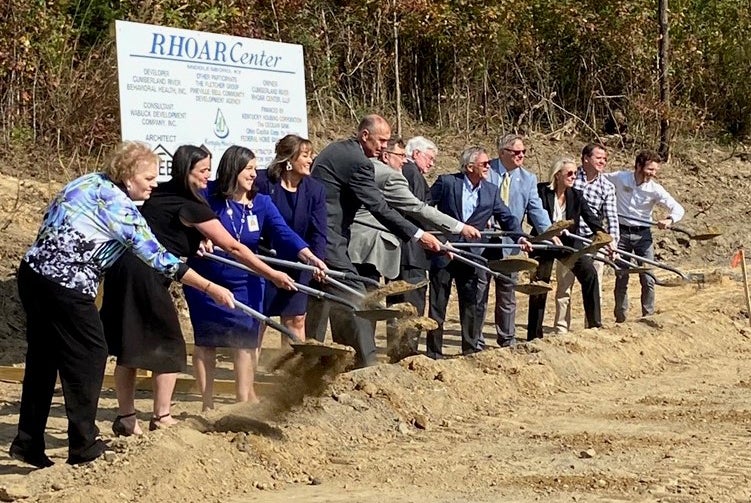RHOAR project gets underway
Published 11:28 am Tuesday, October 25, 2022

- Several dignitaries participate in the ceremonial groundbreaking held Oct. 12 at the RHOAR building site. Photo submitted
JORDAN BROOKS
jordan.brooks@middlesboronews.com
The Cumberland River RHOAR (Recovery, Hope, Opportunity, and Resiliency) Center, a 52-unit affordable housing substance abuse recovery facility in Middlesboro, is scheduled to open in fall of 2023.
With 52 units, the Cumberland River RHOAR Center will provide long-term housing for people recovering from substance abuse. Unlike some recovery programs in Kentucky, the Cumberland River RHOAR will offer medically assisted treatment as well as counseling for those suffering from mental or behavioral disorders.
“We’re coming up on the jackpot,” said U.S. Rep. Hal Rogers after recounting the years-long journey to fully fund the center. “An actual physical place where we can administer treatment for people with addiction who can’t help themselves. This is the best example of being your brother’s and sister’s keeper that I can think of at the moment.”
Based on the highly successful Recovery Kentucky model, the center’s recovery ecosystem can help residents “from crisis to career” with everything from drug withdrawal support to counseling, education and employment. The ultimate goal is community reintegration.
“We started planning it in the fall of 2019,” said Grant Meyer, an economic developer who worked closely with the RHOAR project. “The team we brought together to actually develop it was brought together around January of 2020.”
Recovery Kentucky was created to help Kentuckians recover from substance abuse, which often leads to chronic homelessness. There are 14 Recovery Kentucky centers across the state within the last 18 years.
The Recovery Kentucky model was designed to reduce the state’s drug problem and alleviate the state’s homeless issues. Ultimately, the goal is to help people recover from addiction and gain control of their lives so they can eventually reside in permanent housing.
Thousands of Kentuckians experience homelessness each year. Many of them are “chronically homeless,” meaning they remain homeless for extended or repeated periods of time, often due to chemical dependency and other special needs. While the chronically homeless only represent a fraction of the homeless population, they consume over 50 percent of homeless resources.
While the RHOAR center is not officially part of the Recovery Kentucky program, the group that’s running the center, Cumberland River Behavioral Health, runs a Recovery Kentucky center that serves women located in Harlan County, called Cumberland Hope.
There are several different aspects of the Recovery Kentucky Model the RHOAR center follows, including that modeled by the Scholar House, an innovative housing model that allows parents to obtain housing, child care, and supportive services while they earn a college degree.
“The center itself is for women, but there will be an additional 12 units … where they’ll be allowed to bring their children,” said Meyer.
LT. GOV. Jacqueline Coleman spoke of the trauma that accompanies addiction.
“There is not a family in Kentucky that hasn’t felt that pain,” Colman said. “I’m just so grateful that we are here today to celebrate something that is going to make a difference not just in one person’s life but in the future and the trajectory of their family’s life. That is absolutely game changing.”
Several community stakeholders and elected officials contributed to this project. Funding for the $14 million project came from several sources, including the Kentucky Housing Corp., which provided over $900,000 in Low Income Housing Tax Credits and allocated four million of Federal Housing Trust Fund dollars. The Federal Home Loan Bank of Cincinnati, Capital Corporation for Housing and Bell County Economic Development also provided significant development funds to the project.
“We were funded by the Appalachian Regional Commission to develop some Recovery Kentucky-like centers,” said Meyer. “This [the RHOAR center] is a housing based abstinence treatment facility, however, in some cases it is medically necessary, in some cases, to keep them on some forms of medication and assisted treatment.”
The RHOAR center will primarily serve Bell County and the Cumberland River region, serving several counties in Southeastern Kentucky.






